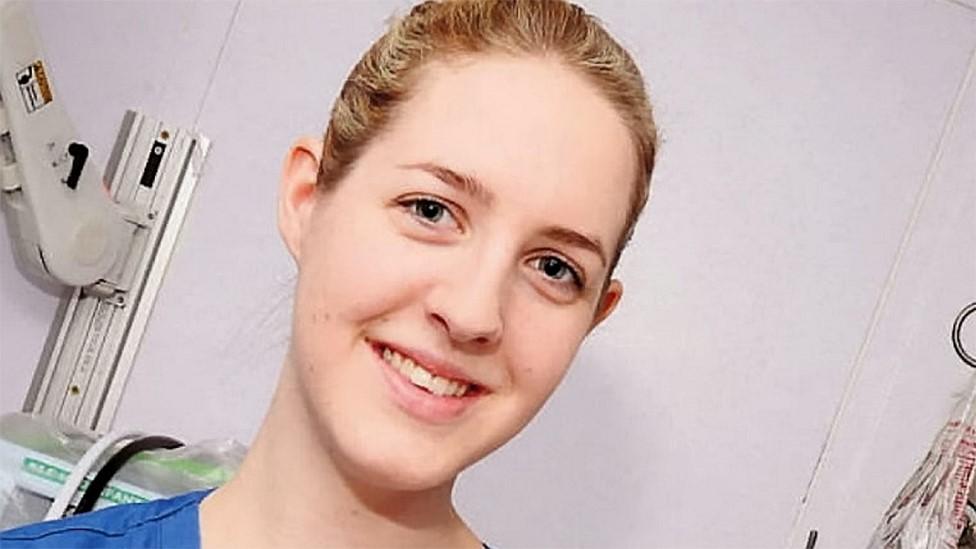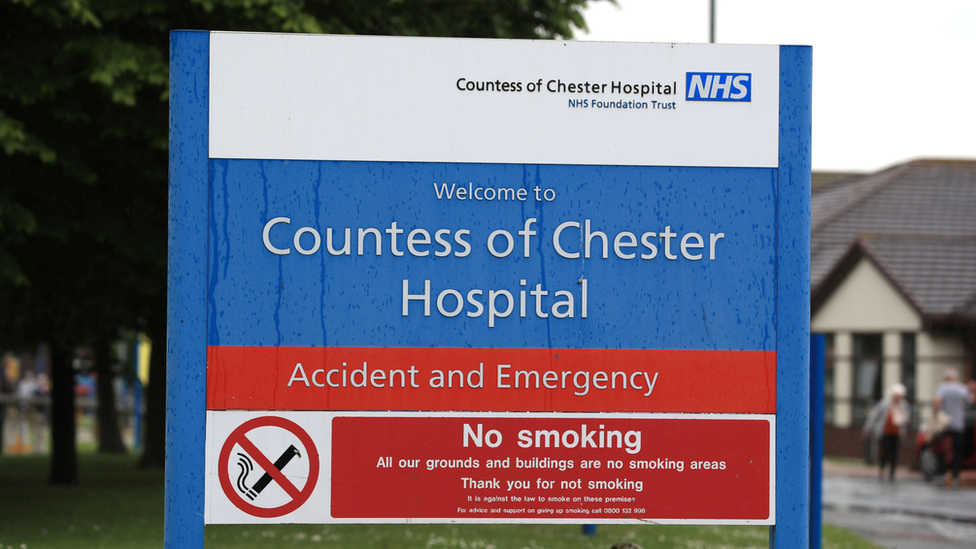Lucy Letby: No natural cause for baby's vomiting, doctor tells trial
- Published

Lucy Letby is accused of murdering seven babies and trying to kill 10 others
A senior doctor has said he "can't think of a natural cause" for a previously stable baby projectile vomiting and struggling to breathe, nurse Lucy Letby's murder trial has heard.
Ms Letby is accused of attempting to murder the premature girl, referred to as Child G, three times at the Countess of Chester Hospital in September 2015.
The nurse is charged with murdering seven babies and attempting to murder 10 others between 2015 and 2016.
Ms Letby, 32, denies 22 charges.
Dr Stephen Breary, who was the on-call consultant at the neonatal unit in early September 2015, said Child G had been "improving" and was "stable" on 6 September.
But at 03:30 BST on 7 September, Dr Breary received an emergency call to attend the unit as the baby had a "very large projectile vomit" which "reached the chair next to the cot and canopy".
"This was not something I had witnessed before," Dr Breary said.
The prosecution alleges Ms Letby, of Hereford, overfed Child G with milk through a nasogastric tube or injected air into the same tube.
'Perplexing'
Dr Breary told the court that Child G stabilised in the early hours of 7 September after being intubated and placed on a ventilator.
However, at 05:30 BST, the infant had a profound desaturation.
"Her heart rate dropped to 60 [bpm] and her oxygen to 40% - which is unusual," Dr Breary said.
Doctors at first believed there could be a problem with the ventilation equipment, so moved Child G to manual breathing support.
She was reattached to a ventilator, but the issues persisted.
"It's perplexing and I can't think of a natural cause why that would happen," Dr Breary said.

The babies were being cared for on the neonatal ward at Countess of Chester Hospital
An X-ray was carried out on Child G later that morning, but Dr Breary said on the scan there "didn't seem to be anything new that would explain the symptoms".
Dr David Harkness, who was working the day shift on 7 September, told the court Child G was "incredibly sick" following her collapse in the early hours.
The medic said on 7 September Child G was "not doing particularly well" despite being ventilated.
He said there was "nothing concrete" from blood tests carried out on Child G that day to explain her collapse.
Ben Myers KC, defending, asked Dr Harkness if he agreed that a sudden deterioration for a premature baby like Child G was "not uncommon".
Dr Harkness said at the time he felt it was "relatively common", but in his subsequent years of experience he has seen considerably fewer sudden collapses.
The jury has previously been told the baby survived but suffered irreversible brain damage and was left with disabilities including quadriplegic cerebral palsy.
'Extraordinary'
Medical expert Dr Dewi Evans, who was approached by the National Crime Agency to review the case in 2017, told the trial it was "astonishing" for such a small baby to vomit as severely as Child G did.
He said: "For a baby of 2kg to vomit that far is quite remarkable. Even more astonishing is the vomit that ends up on the chair. That is several feet away.
"I can't recall a baby vomiting on the floor. I can't recall a baby vomiting that distance. It was described quite correctly as extraordinary."
Dr Evans told the court that there could only be one explanation for this, that Child G "had received far more milk" than the allocated 45mls down her feeding tube.
He told the court that this "cannot occur accidently" and concluded that a member of staff had administered excess liquid with "intent to harm".
Mr Myers KC, defending, asked Dr Evans if he agreed Child G was "born on the margins of survival". Dr Evans agreed.
Mr Myers went on to question the premise of Dr Evans' conclusion.
He said Dr Evans' findings worked on the basis that Child G's stomach would have been empty or almost empty prior to the vomiting.
Mr Myers said "we now know" the stomach was not aspirated prior to 02:00 BST.
Dr Evans said he was "totally satisfied" with his opinion that Child G's stomach was empty prior to the 02:00 feed.
He said the amount of vomit plus aspirate was "massive" and only had one explanation - "she had a huge amount of milk plus air".
Mr Myers responded: "We don't know the quantity of vomit as it was not measured."
"It was an awful lot of vomit", Dr Evans replied.
The trial continues.

Why not follow BBC North West on Facebook, external, Twitter, external and Instagram, external? You can also send story ideas to northwest.newsonline@bbc.co.uk, external
Related topics
- Published6 December 2022

- Published2 December 2022

- Published1 December 2022

- Published30 November 2022

- Published29 November 2022

- Published28 November 2022

- Published25 November 2022

- Published24 November 2022

- Published23 November 2022
